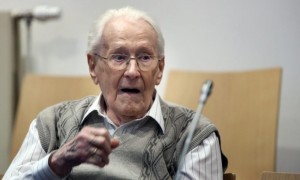 Anything but the banality of evil.
Anything but the banality of evil.
This week, Oskar Gröning, 93, nicknamed “the bookkeeper of Auschwitz,” went to trial in Germany for his complicity in the murder of 300,000 Hungarian Jews over the summer in 1944. The trial is different from previous trials of Nazis since it isn’t about proving that Gröning was a part of the German war-machine that killed one million Jews in Auschwitz alone; he has already admitted it. As The New York Times describes his statements in the courtroom:
“‘It is beyond question that I am morally complicit. This moral guilt I acknowledge here, before the victims, with regret and humility.’ He asked for forgiveness.”
Perhaps the most interesting element of the whole trial is how Gröning’s actions came to light. Elizabeth Kolbert, journalist and recent Pulitzer-prize winner, details the story in an article in the New Yorker about Germany’s failure to bring war criminals to justice. Gröning, a devoted philatelist, met a fellow stamp collector who was a Holocaust denier. When the Holocaust denier sent him a pamphlet called “The Auschwitz Lie,” Gröning felt “felt compelled to point out that the supposed ‘lies’ were true… He should know, since he was there.” Eventually, his comments appeared in an extreme right-wing magazine and after receiving angry calls from neo-Nazis, he wrote a manuscript about his experiences and then sat for interviews with Der Speigel and the BBC.
Gröning claimed that he tried to transfer out of Auschwitz three times. After his third attempt he was sent into combat where he was shot in the foot. Once during his time in the camp, a young child was found in the garbage. From the New Yorker:
“A guard pulled the child by the legs, and ‘when it screamed, like a sick chicken, they bashed it against the side of a truck, so it would shut up.’”
He claimed that he complained to his superior in that case but nothing was done.
The Guardian caught this stunning exchange during the trial:
“When minutes later the judge, Franz Kompisch, adjourned the proceedings for lunch, Gröning unpacked his plastic box and removed a cheese sandwich from its foil. As he ate, he was approached in the virtually empty courtroom by a woman pushing a walking frame.
Eighty-one-year-old Eva Mozes Kor, an Auschwitz survivor and writer who had travelled from Terre Haute in Indiana for the trial in the north German town, said to him: “Mr Gröning, I have much sympathy for you. I know this is mentally, physically and emotionally hard for you and I think you are courageous.”
There isn’t really much to be done — even if he is convicted, at 93, Gröning won’t survive very long. One survivor recommended that he be sent to schools to talk about his experiences during the war. But his case does shine a light on post-War Germany’s willingness to forget about the culpability of its citizens. In a life where he abetted the murder of more than 300,000 innocents, Gröning coming forward is only moral and courageous thing he has done.
The words of this author reflect his/her own opinions and do not necessarily represent the official position of the Orthodox Union.